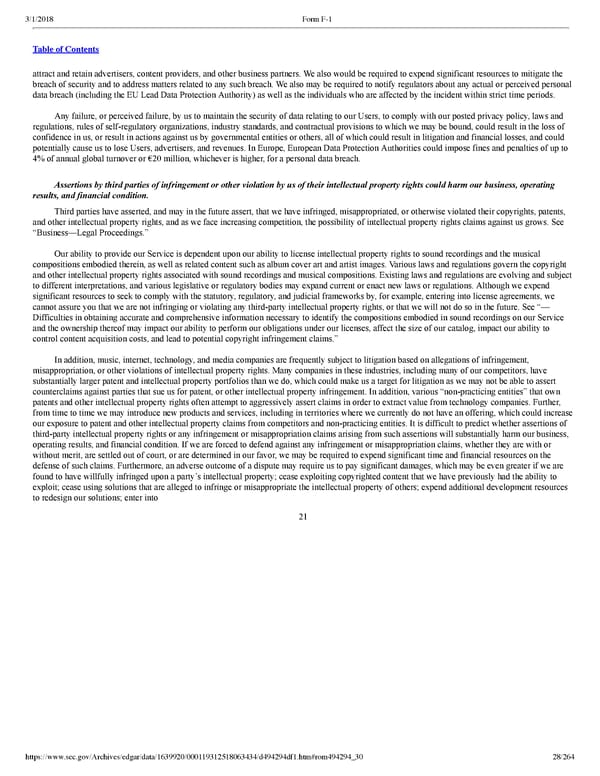28/264 attract and retain advertisers, content providers, and other business partners. We also would be required to expend significant resources to mitigate the breach of security and to address matters related to any such breach. We also may be required to notify regulators about any actual or perceived personal data breach (including the EU Lead Data Protection Authority) as well as the individuals who are affected by the incident within strict time periods. Any failure, or perceived failure, by us to maintain the security of data relating to our Users, to comply with our posted privacy policy, laws and regulations, rules of selfregulatory organizations, industry standards, and contractual provisions to which we may be bound, could result in the loss of confidence in us, or result in actions against us by governmental entities or others, all of which could result in litigation and financial losses, and could potentially cause us to lose Users, advertisers, and revenues. In Europe, European Data Protection Authorities could impose fines and penalties of up to 4% of annual global turnover or €20 million, whichever is higher, for a personal data breach. Assertions by third parties of infringement or other violation by us of their intellectual property rights could harm our business, operating results, and financial condition. Third parties have asserted, and may in the future assert, that we have infringed, misappropriated, or otherwise violated their copyrights, patents, and other intellectual property rights, and as we face increasing competition, the possibility of intellectual property rights claims against us grows. See “Business—Legal Proceedings.” Our ability to provide our Service is dependent upon our ability to license intellectual property rights to sound recordings and the musical compositions embodied therein, as well as related content such as album cover art and artist images. Various laws and regulations govern the copyright and other intellectual property rights associated with sound recordings and musical compositions. Existing laws and regulations are evolving and subject to different interpretations, and various legislative or regulatory bodies may expand current or enact new laws or regulations. Although we expend significant resources to seek to comply with the statutory, regulatory, and judicial frameworks by, for example, entering into license agreements, we cannot assure you that we are not infringing or violating any thirdparty intellectual property rights, or that we will not do so in the future. See “— Difficulties in obtaining accurate and comprehensive information necessary to identify the compositions embodied in sound recordings on our Service and the ownership thereof may impact our ability to perform our obligations under our licenses, affect the size of our catalog, impact our ability to control content acquisition costs, and lead to potential copyright infringement claims.” In addition, music, internet, technology, and media companies are frequently subject to litigation based on allegations of infringement, misappropriation, or other violations of intellectual property rights. Many companies in these industries, including many of our competitors, have substantially larger patent and intellectual property portfolios than we do, which could make us a target for litigation as we may not be able to assert counterclaims against parties that sue us for patent, or other intellectual property infringement. In addition, various “nonpracticing entities” that own patents and other intellectual property rights often attempt to aggressively assert claims in order to extract value from technology companies. Further, from time to time we may introduce new products and services, including in territories where we currently do not have an offering, which could increase our exposure to patent and other intellectual property claims from competitors and nonpracticing entities. It is difficult to predict whether assertions of thirdparty intellectual property rights or any infringement or misappropriation claims arising from such assertions will substantially harm our business, operating results, and financial condition. If we are forced to defend against any infringement or misappropriation claims, whether they are with or without merit, are settled out of court, or are determined in our favor, we may be required to expend significant time and financial resources on the defense of such claims. Furthermore, an adverse outcome of a dispute may require us to pay significant damages, which may be even greater if we are found to have willfully infringed upon a party’s intellectual property; cease exploiting copyrighted content that we have previously had the ability to exploit; cease using solutions that are alleged to infringe or misappropriate the intellectual property of others; expend additional development resources to redesign our solutions; enter into 21
 Spotify F1 | Interactive Prospectus Page 27 Page 29
Spotify F1 | Interactive Prospectus Page 27 Page 29